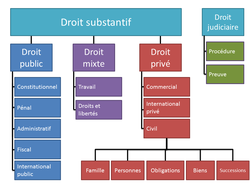
Dec. 11, 2019
Publications

► Référence complète : Frison-Roche, M.-A., Articuler les principes gouvernant les sanctions et les principes animant le Droit de la Compliance, décembre 2019.
____
► Ce document de travail a servi de base à la première des conférences faites dans le colloque qui s'est tenu sous la direction scientifique de Marie-Anne Frison-Roche et de Lucien Rapp, Les incitations, outils de la Compliance, le 12 décembre 2019, à Toulouse,
🚧 voir le document de travail, sous-jacent au thème général: Incitations et Droit de la Compliance, ayant conclu le colloque
Il a ensuite servi de base à un article dans l'ouvrage Les outils de la Compliance, dans la collection Régulations & Compliance.
Lire une présentation générale de cet ouvrage.
____
Résumé du document de travail :
_____
Lire ci-dessous les développements.

Nov. 27, 2019
Publications

This Working Paper served as the basis for an intervention in the conference organized in the conference cycle organized by the Journal of Regulation & Compliance (JoRC) on the theme: Compliance Tools, in collaboration with many university partners: this first conference is organized in collaboration with the Sciences po Economics Department and is held on November 28, 2019 at Sciences po and deals with the more specific theme of Risk mapping.
It also serves as the basis for the book edited by Marie-Anne Frison-Roche, Compliance Tools, which will be released in the Regulations & Compliance collection.
______
Is the consideration by Law of the Risk Mapping mechanism so new?
At first glance yes, and one might even be surprised at this novelty, since this rational anticipation of risks should have been recognized for a long time. But this is perhaps due to the more general fact that Risk itself has only recently become an autonomous legal object in Economic Law, in particular because Risk does not have at all the same position in Competition Law and in Regulation Law (I) .. Its position is even opposed in the both, Risk becoming central in Regulation Law. Compliance Law being the extension of Regulatory Law, it is also built on the "concern" of Risk and the internalization of this consideration in enterprises therefore takes the form of mapping.
A closer look maybe not,even before the specific French laws, called "Sapin 2" and "Vigilance" and beyond them, case law decisions giving a general scope to maps drawn up by operators, or increasing the obligation that 'they have to do it (II). In this, general and precise technical Law offers points of support for Compliance Law, strengthening it in its tools.

Oct. 15, 2019
Publications

This working paper has been the basis for the introduction in the presentation made in the conference organized by the Journal of Regulation & Compliance (JoRC) on the topic : Compliance Tools, in collaboration with many Universities partners.
This first conference has been organized with the Sciences po Economic Department on November 28, 2019 on Risks Mapping.
This working paper is articulated with a second working paper, being the basis of the first development of this conference, on the caractère nouveau ou non en Droit de l'obligation de cartographie des risques.
These two working papers are the basis for two articles published in the collective book, Compliance Tools, in the Series Regulations & Compliance.

Updated: Oct. 8, 2019 (Initial publication: Nov. 22, 2018)
Publications

This working paper served as a basis for a conference done in French for the Centre de droit comparé (Center for Comparative Law) in Paris on 23 November 2018.
Updated, it has served as a basis for an article published in French in a book of the Société de Législation comparé (Society of Comparative Legislation).
________
"The whistleblowers". This is a new expression. Which wins a full success. Barely heard once, we hear it everywhere ...
A theme not only of academic teaching, but rather a topic of daily conversation. Because it is every day that we speak about it, in terms more or less graceful. For example President Donald Trump on October 1, 2019 told the press he "wants to interrogate" the whistleblower who would have unlawfully denounced him and would not have, according to him, the right to conceal his own identity, evidence in this according Donald Trump of the false character of his assertions against him, while his lawyer indicates on October 6, 2019 that he does not speak on behalf of a single whistleblower thus taken apart but of a plurality people who gave information against the President of the United States. Even the most imaginative scriptwriters would not have written twists as abruptly or so fast. Spectators, we wait for the next episode, secretly hoping for climbs and slashs.
Precisely if we go to the cinema, it is still a whistleblower whose dedication and success, or even drama, we are told, for the benefit of the global society, and especially of Democracy, since the secrets are fought for the benefit of the truth. Thus, the movie The Secret Man designates Mark Felt as the first whistleblower. Returning to what is often presented as a more "serious" media, for example in France the radio "France Culture" we can learn the story of a historian who worked as an archivist on events that the political power would have wanted to keep hidden by possibly destroying their traces but that his profession led to preserve
It is also a topic of legislative debate since in the United States the Dodd-Frank Act of 2010 inserted in the 1934 law that established the Securities & Exchanges Commission (SEC) a complete system for retribution and remuneration of whistleblowers, while after elaborating guidelines about about in 2012
In Europe, the Directive first approved by a Resolution of the European Parliament on 16 April 2019 on protection of persons reporting breaches of Union law and then adopted on 7 October 2019 (Directive 2019/78 (EU) of the European Parliament European Union and the Council of the European Union on the Protection of Persons Reporting Breaches of Union law, will have to be transposed in the next two years to the legal systems of the Member States. is not general, since only "violations of European Union Law" are targeted but the character of the "whistleblower" is more generally referred to: it is "whole"
In short, the whistleblower is a star
Recognized by national legislations, which associate to him a legal regime of protection to such a point that, like a tunic of Nessus, it is this legal regime which will define his character and not the opposite. When we read the French law of December 9, 2016 relative à la transparence à la lutte contre la corruption et à la modernisation de la vie économique (on transparency in the fight against corruption and the modernization of economic life), usually known as "Sapin 2 Act", we note that the lawmaker makes much of this character, because he devotes to him the chapter II: "De la protection des
But why a plural? Certainly when we read the recitals of the European Directive of 7 October 2019 on the protection of whistleblowers
Thus seem to contradict in this law "Sapin 2" itself the very title which presents the character, in that it uses a definite plural ("the whistleblowers") while the article of definition which presents the topic does it by using the singular indefinite : "a whistleblower....".
This is a first reason to move forward only in a very cautious way, in this "step by step" that constitutes a word-by-word reading: a gloss. This method consists in taking literally the expression itself. The second reason for this technical choice is that the gloss is well suited to an introduction of a collective work, allowing more specific developments to take place in other contributions, for example on the techniques, the difficulties and the limits of this protection, or the history of it, or the reasons for the arrival in French law of these American or Brithish whistleblowers and the way they develop, or not, in other legal systems or other countries.
I will therefore content myself with taking again literally this already legal expression: The (I) launchers (II) of alert (III).
See below developments.
On the more general fact that cinema is undoubtedly the medium which most seriously restores the state of the Law, c. Frison-Roche, M.-A., Au coeur du Droit, du cinéma et de la famille : la vie, 2016.
L'histoire du premier lanceur d'alerte, France Culture, septembre 2019.
European Commission, Guidelines on Whistleblowing, 6 of December 2012, SEC(2012) 679 final, updated on 23 of April 2018.
However, precisely the so common use of plurality ("whistleblowers") raises doubts about the uniqueness of the character. On this question, see. all the first part of the developments of this study, which leads to the conclusion rather than beyond the multitude of particular cases, there are rather two kinds of whistleblowers. V. infra I.
The director of the film La fille de Brest says that she considers the whistleblower at the origin of the case of the Pick as a "movie character".
Thus, the adventures of Snowden were brought to the screen by Oliver Stone in 2016, Snowden. On the question of knowing whether this film "faithfully reproduces" or not the case, Schetizer, P., Le film Snowden est-il à la hauteur de la réalité?, 2017. This article is favorable to the whistleblower, and to the film which tells us with emotion his case, in particular because (sic), it is easier than to read the Washington Post.
Underlined by us.
Underlined by us.
About this directive, v. the developments infra
Underlined by us.

Updated: Sept. 25, 2019 (Initial publication: June 17, 2019)
Publications

This working document is the basis for an article published in the Archives of Philosophy of Law (APD).
Summary: Painting so well that the canvas is a living object is a technical feat that was achieved by little
_______
In numerous writings and interviews, The painter Francis Bacon explains his act as a painter: it is "preserving the vitality of the canvas". In the book he devoted to it, Gilles Deleuze pointed out that Bacon said that "the procedures used do not force the Figure to stand still"
With the same pedagogical friendliness, in numerous writings and interviews, the jurist Carbonnier explains his act as a legislator, in particular in his collection of texts Essais sur les lois: legislate well, and let life unfold through texts, well after their adoption, because posed on pages which are never white, written compositions which are only the "varnish" of the life which must be able to throb in these Laws which one presents however so often but so strangely as "engraved in marble ". While on the contrary it is only a question of "preserving" the vitality of what is under the letter of the Law, the life of each one, life which does not resemble that of the neighbor, to obtain that the web of the legislative system is so flexible that this system lives by itself after the promulgation of the texts.
But it may seem to force the line to find elements common to two characters who undoubtedly were unaware of their reciprocal existence or at least, although living at the same time, did not appear similar. Before showing how similar their action is, therefore, put them face to face beforehand.
PREREQUISITES REQUIRED: FACING FRANCIS BACON AND JEAN CARBONNIER
Thus, the family painted in broad outlines by a few new articles of the Civil Code written by Carbonnier could nevertheless flourish afterwards, in each family, without the need to rewrite the text. One might be surprised that Carbonnier expressly only likes the Law and not the judiciary, this association of the Right to the Law often being worth rigidity; yet - and the formula made him famous - he conceived of the Law as only "flexible", without recognizing the judge as a general source of the Law, without recognizing him the power to soften over time the edge of the adapted law formerly, then once. In fact, the Flexible Droit volume brings together almost only texts relating to laws, while in his latest work, Droit et passion du Droit sous la Vième République, he challenges the influence of the courts over the Law.
Carbonnier abides by the Law. These laws which we are constantly told us that their quality should be never to move .... And to evoke in order to convince us the imperative of legal certainty, predictability, etc., each new report on the subject saying the same thing as the previous one, this one serving as a reference for the next one.
Thus, all these numerous works explain to us that, in the ideal towards which one should tend, the Law does not move in the main lines while the judge, by "jurisprudence" comes to adapt it and that thanks to "dialogue ", even to the" dialectic "between legislation and jurisprudence", cahin-caha we arrive at something suitable. In practice. And here is legal security well served, since it would be the only concern. A universal model to apply everywhere , at everything.
But this presentation, now very common and also constituting the vulgate of the economic analysis of law, does not correspond to the conception of Carbonnier, who did not admit the creative power of the Judge, being, like Motulsky, above all a jurist . Because if he asked as a question "Any law in itself is an evil?", It is only to answer it firmly: No, going so far as to compare in this article the announcement of a new law with the announcement made by the angel Gabriel.
Perhaps it is his attachment to the Law, his refusal to consider the jurisprudence as the source of the law, his respect for the legal matter itself that make his work today less cited than the work of sociologists who do not know not more the legal technique than the economists who describe the "legal regulation" to adopt to be effective? It should also be noted that its legislative art is little used today
It is true that to make a painting, to have the strength to fade in front of your canvas, you must master the technicality to return to the childhood of art, ambition of all artists, all teachers, all the Masters. Francis Bacon, also a wise reader of writers, rejecting the modern opposition between painted lines and written texts, repeated at each interview that he awaits "the accident" which comes alone to get the flesh out of the skin that traps him
The theme of Carbonnier Sociologie juridique's book is this necessary presence of law in a sociological analysis which would not betray the law presented while managing to keep its distance: that is to say, let it breathe, allowing us to watch live. This is why, like Truffaut, he took an interest in children's pocket money.
By a game of mirrors, Carbonnier explained, for example about the reform he conceived of the Law of matrimonial regimes and whose genesis he explained in an article in L'Année sociologique
Admittedly, one could underline that if Francis Bacon signed his tables, which attaches to him the work and holds the Figure which moves there, it was not the case for Carbonnier. You must already be a scholar to know that the author of the train of reforms of the XXth century which transformed the Civil Code has for patronym "Jean Carbonnier": the Legislator is an abstract character, who, like the State, always carries this same title , like the King, and passes indifferently from head to head, from the dead instant to the crowned instant. Whoever looks at the painting will attribute it to Francis Bacon because it is written on it, while on the contrary he will designate for example the law of July 15, 1975 as the law reforming the law of divorce, without referring to the human being who designed it. Yes, it is the Parliament, which, in the name of the People via the Representation, is the author of the Laws. And not such and such.
So the comparison would not be worth. But let's take a detour by Romain Gary. The action of this one showed what one could call "the right of the literature", ie what can go the power of this one. Its power is so great that the author can never appear in it
There is no need to go to Law & Literrature, a current which dries up the Law rather to cover it with a conception of the Law as a fabric of strategic lies and retrospective narratives of justification of decisions. No, Carbonnier, far too erudite and far too good a jurist to go towards a thought above all critical of an object, made sociology to show us a living Law and at the same time had a sociological conception of Legislative Art , writing laws which capture in their austere lines the daily and various lives which will come after the writing of a law which writes only in capital letters, general, aiming nothing special so that the particular remains in the hands of each individual
But how, if we get the judge out of the normative game, can the law be "flexible"? If not by drawing up laws which "preserve" in themselves, in their "canvas" even their vitality, which allows them to move, in an ink which must never be dry or reach marble?
Why not make the connection between the two creators, Francis Bacon and Jean Carbonnier?
How even not to do it, the design and the method are so similar to them.
When Bacon paints scenes of daily life as a field of ruin, while Carbonnier aims only "the interest of the child", on which one glosses so much, only as "a key which opens on a vacant lot"
For the two authors, painting for one and the law for the other, both must tear them away from their static support so that there is expressed and "preserves" life in its mobility itself. Even more, it is thanks to this support, which we thought motionless, that the fluidity of life appears to us. Thus life is, for them, the common object of painting and the law. This definition is carried by few people, because we find so often in the presentations which are made of the Law the imperative of a choice to operate, to put on the side of the immobile or on the side of the mobile, but not this conception of mobility expressed by an immobile support (I). It must be recognized that few have the level of technical mastery and thinking of Bacon and Carbonnier.
But if we go back to Carbonnier's conception of the law, while at a distance, as would do, in his own words, in his own country a "foreign" legislator


The two authors thus put life at the center, one of the tables, the other of the laws. Yet two motionless objects, some made of "canvas", others made of "marble".
But both wanted - emphasizing the difficulty of the task - forcibly reinserted into the materially intrinsic immobility of the object - the canvas of the table that the flaking of the paint by the passage of time will damage , the letter of the Law that subsequent reforms will challenge - life. That is to say, finally give them their true object. And yet impossible to restore. And they got there. Undoubtedly by their own qualities: mastered technicality, modesty, perseverance, effacement before life itself which unfolds and occupies all the space and "does its work" on the support, which becomes mobile. Thus Francis Bacon's paintings move as the laws written by Carbonnier live, which is natural since it was directly inserted. What modesty was it worth to fade to this point.
Achieve by technical prowess that life is still throbbing in the canvas, in the text published in the Official Journal. Only in what by nature is fixed: the canvas, the Law, not only does life still throb, as if by "inadvertence", as Francis Bacon says, because life has a hard life, but because the masters that they were so delicate and so masters of their Art that they made everything that it was the very object of their work: the canvas of the picture was for Francis Bacon what life was made of, the marble of the law was for Carbonnier that by law life was made.
So as when the Master of Sewing removes the thread, the canvas no longer exists, the diary has long been lost, but life is still there. This is no coincidence, as sociologists who seem to boast of knowing nothing about law seem to present, speak of a "legislative vacuum" and always ask for more "new laws", sometimes stressing that Carbonnier was also arbitrary in law that bad in sociology - because there is to say it.
On the contrary, it is the Law bringing to its perfection: practical art, the Law relates to life and if in advance, in its very conception, it knows how to fade in front of life, it then joins in practice the art of painting because it takes a painter to force life on canvas (I). This requires a painter, because we often talk about legislative art but it is also appropriate to talk about artists who hold the pen. These do not "regulate", they draw a picture which, through the effect of correspondence, can let life continue to unfold because the ink is never dry. Of this table, it is the law which forms the framework, a light framework which allows to keep contours to what is the Right and what is not. Carbonnier always knew that in relation to life, Law was only a "thin varnish". Like all great masters, it was modest, drawing up great pictures, that were the complete reforms of the Civil Code that he wrote, never forgetting to conceive them only as a varnish so that life always finds its way out, breathe, in the same movement of a woman coming down the stairs or of a Pope who rules on his throne (II).
Il est remarquable que pour Bacon, Van Gogh, que le premier considére comme un "héros", a peint d'une "façon littérale" et que c'est grâce à celui qu'il a pu grâce à son "technicité" restitué "la vie" désertique du paysage.
Deleuze, G., Francis Bacon, rééd. par Badiou, A. et Cassin, B.,
...., in Verdier, R. (dir.), Jean Carbonnier. L'homme et l'oeuvre.
Comment dès lors ne pas penser à la définition de l'écriture par Céline, la définition comme le fait de tanner sa peau sur la table de l'écrivain ?
Terré, Fr., Jean Carbonnier et l'année sociologique, L'Année sociologique, 2007/2, vol.57, pp.555-569.
"le droit de la littérature est de n'y apparaître jamais comme auteur".
Comme le souligne très bien Frédérique Niboyer, pour montrer que les lois actuelles qui visent tous le cas possibles (ce qui est impossible) empruntent une méthode contraire à celle de Carbonnier : ""Le doyen Carbonnier avait une autre conception : une loi générale devait pouvoir s’adapter à tous (d’où le pluralisme du droit de la famille) tout en ouvrant des champs à d’autres ordres normatifs, alors qu’aujourd’hui le « légicentrisme » devient roi : la seule norme à laquelle on fasse confiance serait ici la loi qui, partant, doit être spécialisée pour chaque catégorie.".
Cité par Frédérique Niboyet, L'héritage de Carbonnier dans le droit matrimonial actuel : entre continuité et rupture, 2012, n°5.
Carbonnier, "A beau mentir qui vient de loin",

Updated: Sept. 24, 2019 (Initial publication: Aug. 31, 2019)
Publications

Summary : In August 2019, about the fire devastating the Amazon, the French Minister of Ecology says that this fact "is not just the business of a state" (n'est pas que l'affaire d'un Etat). This assertion denies the postulates of Public International Iaw (I). This supposes a new system, based on the idea that the power of the State on its territory is erased when the object that is there is no longer related to this "part" but to the All that is Universe (II). Let's accept the augur. First question: if it is not only the case of a State, whose business is it? (III). Second question: to anticipate the other cases that fall under this regime, what should be the criteria in the name of which the All will have to prevail over the part and who will then take care of the case of which the "local" State is divested? (IV). Because the perspective goes beyond the environment, beyond Brazil, beyond the States. It leads to Compliance Law animated by "monumental goals" that are the concern for the Universe and humans, in a humanist spirit. Let's go.
___
On August 27, 2019, on the French radio France Inter, Elisabeth Borne, French Minister of Ecology (Transition écologique) expresses it clearly: "Quand on est sur un enjeu tel que l'Amazonie, ça n'est pas que l'affaire d'un État", that can be translated : "When we are on a stake such as the Amazon, it is not only the business of one State ".
Starting from one case, "the Amazon", the Minister, thus taking up the position of the French President, associates a general consequence: "it is not only the affair of one State".
This is not a trivial sentence.
This affirmation denies, and why not, the entire system of Public International Law (I). By a new reasoning based on the idea that the All prevails, as by an effect of nature, on the Part (II).
Admitting this, it leads to opening two sets of questions. The first is related to the following main question: if it is not only the case of one State, of which is this the concern (III)? The second set of questions revolves around the questioning of the criteria on behalf of which other cases must be seized in the name of "All " and how to do it (IV).
A. The postulate of Public (and Private) International Law: parties (States) which, because of common interests, are in contact
The notion of State includes in its very definition the notion of territory (a territory, a population, institutions).
Thus the State governs through its institutions what is happening on its territory. For example, if there is a fire, or a risk of fire, the State makes arrangements through all legal, financial, technical and human instruments available to it. It is accountable for what it does through its political and legal responsibility.
When what is happening on its territory exceeds this one, in fact (epidemic, catastrophe with the consequences exceeding the borders, migrations, etc.) either according to its own opinion or according to that of the other States, the States, being sovereign subjects of Law in the international system, act together on a pre-built legal basis: bilateral or/and multilateral treaties!footnote-1675, having created legal integrated zones (like the European Union or the United States) or international institutions (like the IMF).
A particular technique has been developed for several millennia - but here again the seniority is not sufficient to keep the system: diplomacy, anchored in each state in a particular ministry: the Ministry of Foreign Affairs, which each national government has. If one State totally excludes one phenomenon in the territory of another, the progressive procedure of ceasing diplomatic ties begins.
This can result in wars.
In the "case of the Amazon" both the President of Brazil and the President of the United States stick to the classical construction of Law.
Indeed, the former asserted that the Amazon is in the territory of Brazil, thus falls under the jurisdiction of the power of the Brazilian State and the Brazilian Law, from which it follows that another State does not have to come to interfere. However, the French President takes the floor not as this forest extends also on a French territory but as it is the business of the World. On the contrary, the President of Brazil claims the closing effect, which excludes a third State from taking over directly something - even a difficulty - that takes place in the territory of another.
The President of the US federal State has said that these are joint decisions between the President of Brazil and other heads of State, sovereign subjects of Law, who must agree to organize a solution to solve a local problem . Because in the same way that States can declare war, they can help each other!footnote-1676.
The whole Public (and Private) International Law is therefore based on this assumption: "parts" of the world, on which sovereign parties (States) have taken contact, because circumstances make something that falls within one of them or several others.
This is precisely what is called into question. The notion of the "right of interference", whose evocation we hardly hear any more, had already done so. But on another basis.
B. The "right of interference": idea that somebody can directly interfere with what happens in a country , an idea that does not question the postulate of the International Maw, an idea that rests on something else: a " right for the other "
The "right of interference" is the idea that in certain territories, things happen that are inadmissible.
In memory of the jus cogens, a kind of "Natural Law" of Public International Law, Another, that could be another state, can come to meddle with what is happening in a territory that is closed, without declaring war. to the state that keeps its borders.
It is the need of others, for example those who die in mass on this territory, or the nature that is devastated in the indifference of the State on whose soil the disaster is happening, which founds this "right" of another state to come and take charge.
The foundation of this "right" is therefore a "duty".
C. The new idea: a territory is only part of the Globe, whose fate is everyone's concern
The idea is new because it is not based on altruism. And no more about self-interest. Yet, de facto and de jure , the Amazon is not on the sole territory of Brazil.
France is particularly well placed to say something about it since part of the Amazon is on French territory.
Thus the inaction of the main concerned Brazil directly affects the interest of France, a "forest" being a block that can not be divided. If we were in Property Law, we would say that we are in indivision with Brazil and that in this respect, with the other States on whose territories this forest extends, a solution must be found.
Because of the indivisibility of this particular object which is this particular fores!footnote-1644, it is necessary that the States whose territory is concerned have a say in the matter.
But this is not the argument put forward by France, particularly by the President of the Republic.
It is said that the whole world is concerned about the fate of the Amazon. It could be said that, in this respect, when what could be described as a "global forest" is well treated, its management does indeed fall within the power of Brazil, Brazilian companies and the Brazilian State, but when it is abused to the point of seeing its future compromised, when fires may make it disappear, then this forest appears not to be localized in Brazil but being located in the World, of which Brazil is only a part!footnote-1648.
This reasoning, which then gives voice to everyone, for in the world every state is included in it, is a new reasoning.
The economic-political theory of the "commons" does not account for it because it is not a very legal theory!footnote-1656.
II. THE NEW REASONING THAT COVERS THE CLASSIC REASONING OF PUBLIC INTERNATIONAL LAW
The new reasoning adopted by the Minister consists in saying that the Amazon does not concern only Brazil. This forest should therefore be directly related to the World (A). This is a welcome change in the system but based on a paradox (B).
A. When the Amazon is in danger of death, then it should no longer be attached to this part of the World that is Brazil, but directly to the World
This forest is presented as the "lung" of the planet, it is the "future" of humanity. In this, it can concern only one State, not even the one on whose territory this "Humanity good" is located!footnote-1643.
As such, without the need to declare war to Brazil, another State may speak, for example the French State through the one that represents it in the international order, that is to say its President, to say what to do, since according to him the President of Brazil does not say or do what it is absolutely necessary to do for the whole planet and for the future of Humanity.
This induces a complete renewal of international institutions.
Indeed a direct attachment to the World and no longer to Brazil gives the forest object a special status because of a goal that exceeds Brazil: save the Amazon would impose because it would save the world. Therefore, it can no longer be the subject of Brazil, which would be like "dispossessed" by a goal that is imposed on it: to save the Amazon rainforest, even though it is mainly on its territory, while other States become legitimate to dispose of this object, even if the forest would not be in part in their territory, even if they would not be affected in their own interests.
This contradicts all Public International Law!footnote-1645; because the agreement of the political representatives of Brazil is no longer required and no one yet evokes the need to declare war to Brazil, and fortunately!
Such an upheaval justifies that such an affirmation is accepted with difficulty. One understands better than first consequence, which is not so innocuous, one of the first rules of diplomacy which is the politeness, between the heads of state, with regard to the spouses of these , have be broken!footnote-1657, that the remarks have slipped on personal questions, etc.
B. A welcome but paradoxical change in the system
Why not change the system?
This is difficult to admit, not only because it is brutal, but because it is paradoxical.
The paradox is the following. It is recognized that the theme of the disappearance of borders by "globalization"!footnote-1647 no longer reproduces the reality of facts!footnote-1646, especially not the Chinese situation, the digitalization having on the contrary allowed the construction of even stronger boundaries. What we called "globalization" now belongs to the pastWhat we called "globalization" now belongs to the past!footnote-1660. So today we should recognize on one side the reality of borders - which had not disappeared or are reborn - but only to better step over them, since - based on the concern of the world - states, yet each in their borders, would be legitimate to go directly to intervene in the business of others.
The paradox is therefore, on the one hand, the rejection of the allegation of a de facto disappearance of borders by an economic interdependence, technology having denied "globalization" as a fact !footnote-1649 and the linked resurgence of borders allowing States to affirm more than ever that they would be "sovereign masters at home", which should logically lead to let Brazil decide for the Amazon, while yet on the other side we witness the questioning of the postulate of Public International Law as recognition of sovereignty and construction from agreements between states, requiring the agreement of the state whose territory is concerned (except war), questioning which leads to allow all to meddle with the fate of the Amazon, as if there was no border.
This paradox leads to two questions.
The first question is: if "it's not juste one State affair", who's concerned?
The second question is: after the "case of the Amazon", what are the other cases? And how are we going to provide solutions, if we no longer have the solutions of Public International Law, that is to say, the agreement of the country whose territory is concerned and which we do not want not go to war?
If we have clear ideas on the answers to be given to these two sets of questions, then because indeed when the future of all is in progress it can not be the affair of a single State, it is necessary to question Public International Law. But do we have clear ideas on these two questions? And what are the possibilities for possible solutions?
See the text following below.

July 22, 2019
Publications

This working document serves as a basis for a contribution to the Grands Arrêts de la Propriété intellectuelle (major cases in Intellectual Property), published under the direction of Michel Vivant, in the new section devoted to Regulatory perspective.
Conceived as a "regulatory tool", intellectual property is then used by the State as an "incentive for innovation". Public authorities adopt solutions that stem from sectoral concerns that permeate intellectual property. Because the economic sectors become prime, the systemic perspective then prevails in the solutions retained in the judgments passed by the courts.
One can see it through three French court decisions:
► Civ., 1ière, 28 février 2006, named Mulholland Drive ;
► Paris, 11 décembre 2012, Sanofi-Aventis ;
► Civ., 1ière, 6 juillet 2017, SFR, Orange, Free, Bouygues télécom et autres.
Summary:
Intellectual property, derived from the State and inserted in a public policy, can be conceived, not to reward a posteriori the creator but to incite others to innovate. It is then an Ex Ante tool of Regulation, alternative to subsidies. If private copying is an exception, it is not in relation to the principle of competition but in an insertion in a system of incentives, starting from the costs borne by the author of the first innovation: the owner of the rights is then protected , not only according to a balance of interests, but in order not to discourage innovative potentials and the sector itself. (1st decision).
The sectoral policy then pervades the intellectual property used to regulate a sector, for example that of the drug. While it is true that a laboratory wishing to market a generic medicine did not wait for the patent expiry of the original medicine to do so, it is not relevant to sanction this anticipation of a few days because investments made by the holder of the intellectual property right have been made profitable by it and because the public authorities favor generics for the sake of public health (2nd decision).
The systemic interest provides and that is why Internet service providers have to bear the costs of access blocking while they are irresponsible because of the texts. This obligation to pay is internalized by Compliance because they are in the digital system best able to put an end to the violation of intellectual property rights that the ecosystem requires to be effective. (3rd decision).
It is necessary to underline the paradox represented by the infatuation of the theoreticians of Regulation with intellectual property, whose legal nature it transforms by an exogenous reasoning(I). Influenced, the case law uses reasoning based on incentives, investments, returns and costs, so that the State obtains the operators expected behaviors (II). As a natural result, there is a sectoral segmentation, for example in telecommunications or pharmacy, which ends up calling into question the uniqueness of intellectual property, according to the technologies and public policies that affect them (III). There are still imputations of new obligations on operators just because they are in the technical position of implementing intellectual property rights: the transition from Regulation to Compliance is thus taking place (IV).

Updated: July 4, 2019 (Initial publication: April 30, 2019)
Publications

► Complete reference : Frison-Roche, M.-A., Having a good behavior in the digital space, working paper, April 2019.
____
Summary: The jurist sees the world through the way he learns to speak
The Law of the Environment has already come to blur this distinction, so finally so strange because this classical conception refers to a person taken firstly in his immobility (Law of individuals), and then in his only actions (Contrats and Tort Law, Property Law). Indeed, the very notion of "environment" implies that the person is not isolated, that he/she is "surrounded", that he/she is what he/she is and will become because of what surrounds him/her ; in return the world is permanently affected by his/her personal action. On second thought, when once "Law of Individuals" was not distinguished from Family Law, the human being was more fully restored by this division in the legal system that not only followed him/her from birth to death but also in him/her most valuable interactions: parents, siblings, couples, children. Thus Family Law was finer and more faithful to what is the life of a human being.
To have instituted Law of Individuals, it is thus to have promoted of the human being a vision certainly more concrete, because it is above all of their identity and their body about what Law speaks, astonishing that we have not noticed before that women are not men like the others. To have instituted the Law of the people, it is thus to have promoted of the human being a vision certainly more concrete, because it is above all of his identity and his body that one speaks to us, astonishing that the we have not noticed before that women are not men like the others
From this concrete vision, we have all the benefits but Law, much more than in the eighteenth century, perceives the human being as an isolated subject, whose corporeality ceases to be veiled by Law
This freedom will come into conflict with the need for order, expressed by society, social contract, state, law, which imposes limits on freedom of one to preserve freedom of the other, as recalled by the French Déclaration des Droits de l'Homme of 1789. Thus, it is not possible de jure to transform every desire in action,, even though the means would be within reach of the person in question, because certain behaviors are prohibited in that they would cause too much disorder and if they are nevertheless committed, they are punished for order to return. Thus, what could be called "law of behavior", obligations to do and not to be put in criminal, civil and administrative Law, national and international Law, substantial Law and procedural Law :they will protect the human being in movment pushed by the principle of freedom forward others and thing, movement inherent in their status as a Person.
The human being is therefore limited in what they want to do. In the first place by the fact: their exhausting forces, their death that will come, the time counted, the money that is lacking, the knowledge that they does not even know not holding, all that is to say by their very humanity; Secondly, by the Law which forbids so many actions ...: not to kill, not to steal, not to take the spouse of others, not to pass as true what is false, etc. For the human being on the move, full of life and projects, Law has always had a "rabat-joy" side. It is for that reason often ridiculous and criticized because of all its restraining regulations, even hated or feared in that it would prevent to live according to our desire, which is always my "good pleasure", good since it is mine. Isolated and all-powerful, the human being alone not wanting to consider other than its desire alone.
Psychoanalysis, however, has shown that Law, in that it sets limits, assigns to the human being a place and a way of being held with respect to things and other persons. If one no longer stands themselves by the prohibition of the satisfaction of all desire (the first of which is the death of the other), social life is no longer possible
But this presentation aims to make it possible to admit that the criterion of Law would be in the effectiveness of a sanction by the public power: the fine, the prison, the confiscation of a good, which the rudeness does not trigger whereas Law would imply it: by this way we are thus persuaded of the intimacy between the public power (the State) and Law... But later, after this first lesson learned, the doubt comes from the consubstansuality between Law and State. Is it not rather appropriate to consider that Law is what must lead everyone to "behave well" with regard to things and people around them? The question of punishment is important, but it is second, it is not the very definition of Law. The French author Carbonnier pointed out that the gendarme's "kepi" is the "Law sign", that is to say what it is recognized without hesitation, but it is not its definition.
The first issue dealt with by Law is then not so much the freedom of the person as the presence of others. How to use one's freedom and the associated deployment of forces in the presence of others? How could I not using it when I would like to harm them, or if the nuisance created for them by the use of my free strength is indifferent to me
We do not use our force against others because we have interest or desire, we do not give him the support of our strength while he indifferent us, because Law holds us. If the superego was not enough. If Law and the "parental function of the States" did not make alliance. We do it because we hold ourselves
Or rather we were holding ourselves.
Because today a new world has appeared: the digital world that allows everyone not to "hold" himself, that is to say to constantly abuse others, never to take them into consideration, to attack massively. It's a new experience. It is not a pathological phenomenon, as is delinquency (which simply leads to punishment), nor a structural failure in a principle otherwise admitted (which leads to regulatory remedies) but rather a new use, which would be a new rule: in the digital space, one can do anything to everyone, one is not held by anything or anyone, one can "let go" (I). This lack of "good behavior" is incompatible with the idea of Law, in that Law is made for human beings and protect those who can not afford to protect themselves; that is why this general situation must be remedied (II).
Cornu, G., Linguistique juridique, 2005.
Frison-Roche, M.-A. & Sève, R., Le Droit au féminin (ed.), 2003.
Under this "mask" of the "subject of Law", we are all equal. S. Archives de Philosophie du Droit, Le sujet de droit, 1989.
Baud, J.P., L'affaire de la main volée. Histoire juridique du corps humain, 1993.
On neurosis as a constitutive mode of child sociability, s. Lebovici, S., "C'est pas juste", in La justice. L'obligation impossible, 1994.
Read the article of Alain Supiot about the idée of Rule common of all, under the discussion between all, presented by this author through the artwork of Kafka : "Kafka, artiste de la loi", 2019; Kafka is very present in the work of Alain Supiot, for example in his First Lesson in the Collège de France, 2012, or in an Introduction of La Gouvernance par les nombres ; This latter book is now available in English : Governance by numbers. The making a legal model of allegiance, 2017 (translated by S. Brown).
That's why splitting Persons Law and Family Law masks another reality: the family is not made up of third parties. The links are there. They pre-exist. Starting from the only Persons Law pushes to think one can "build" his/her family by links drawn on white paper: the contracting of the families made up of individuals becomes thinkable, even natural.

Updated: May 27, 2019 (Initial publication: May 13, 2019)
Publications

First of all, this working document was used as a support for an oral intervention done in French on the general topic. L'officier ministèriel est-il soluble dans la blockchain ? (Is the ministerial officer soluble in the blockchain?) at the "Club du Droit", which took place at the Conseil supérieur du Notariat on May 14, 2019, in Pars.
Consult the general presentation of the conference (in French).
Then it serves as a basis for an article to be published in the Revue Defrénois (in French).
______
Introduction & Summary.
The technical analysis of the confrontation between the tool that is the blockchain and the function that ensure these particular people who are the "ministerial officers"
For this, it is necessary to keep in mind this distinction so simple: the blockchain is a tool, a thing, a machine, an algorithm, a mechanical, mathematical power, while the ministerial officer is a human being.
This refers to the distinction that the Western legal system, whether Civil Law or Common Law, poses as summa divisio: the distinction between human beings and things. This first distinction is formulated so that we do not treat human beings as things, since they are legally qualified as "person"
For this essential distinction to remain effective, not only should we not imagine human beings as things (reduced to their bodies, for example, or reduced to mechanical acts of consumption
But technology represents more and more things with anthromophormi forms and reactions , through robots which "speak", "intelligent" machines, etc. The economic success of promoters of machines and other human-like robots, mechanical solutions presented as "intelligent", is based on forgetting the distinction between the person and things. It is certainly possible to erase this distinction from our system of thought. The difficulty is that it is the basis of Western Lawl
It is this background that is played in the practical questiond of insertion of blockchains and other technologies and the way in which the various professions must exercise their functions today. If these tools are consistent with these functions, or even improve them, professionals must welcome them without suspicion, or even participate directly in developing them. If these tools are not capable of fulfilling certain functions entrusted to these professionals, then these functions must not be inadvertently or maliciously inserted into a blockchain, whose capacity for preservation and reliability does not amount to anything, because a thing doesn't have any ability to think.
This is why we must start from the functions, by dinstinguising the technical function of conservation, duplication and elaboration of acts (I).
It seems that assuming the technical reliability of preservation and duplication acquired through the blockchain, as soon as there is a part of elaboration in the act, human intervention must step in because a machine is unfit to check the facts. Here we find the distinction between the retranscribed negotium, this retranscription never being mechanical, and the instrumentum itself, which, split from what gave rise to it, can be subjected to duplicative and conservation technologies. These technologies of conservation and duplication could be so efficient that the notions of original and copy could be questioned because of the reliability of the blockchain (II).
Thus the blockain is an effective technology on the instrumentum as documents divided from the negotium, but it can not guarantee the correspondence between the two ; it has only the reliability in the conservation, the availability and the duplication to infinity of the instrumentum, of what is extremely useful, and justifies that ministerial officers incorporate this technology. But the function of these are not limited to being agents of conservation and duplicators. We do not simply move from the copyist monk to the blockchain. The main and so precious function of the ministerial officers is to check the accuracy of the mentions of the instrumentum in relation to the reality of the negotium. This is so precious for a market economy to have this correspondance
This would be the choice of a very liquid and unsecured market (without intermediary, with the benefit of lower cost in Ex Ante and higher risk for the long term). In policy, the balance is always between security and liquidity, especillay in financial systemic policy. This was done by American Law, wich prefered low costs and high liquidity, especially for real estate loans, which were securitized by subprime mortgages. For the moment, this choice is not made in this sense by European Law, safety concern in the elaboration of the acts being preferred and the distinction between the human aptitude and the mechanical aptitude remaining. And we know that in the first system the reajustment takes the form of a general crisis, which reinjects the reality of the negotiums, lost in the instrumentums. What price are we ready to pay ?
Once this distinction is clearly made, because the elaboration of an acte mus be made bye the ministerial officer, human being invested by the State of the particular charge ensures the accuracy of the mentions of the act with the reality of people, wills, obligations and goods, it is all the more expedient for ministerial officiers to organize themselves to develop blockchain technology. Indeed, once this act has been developed reliably, ans as such deserves to be "authentic", because of the continuum between elaboration, preservation and duplication, because it is up to the ministerial officiers to draw up the deeds more incontestably reliable. It is up to them to equip themselves with the technological means of best conservation and duplication of acts elabored by them (IV).
Sur la confrontation déjà faite dans l'analyse économique de la "régulation" et la fonction notariale, v. Frison-Roche, M.-A., ....
Frison-Roche, M.A., Pour protéger les êtres humains, la nécessité éthique de la notion juridique de personne, 2018.
Anders, G., notamment dans son ouvrage central L'obsolescence de l'homme (1956), présentant l'être humain réduit à l'état de "machine désirante" par une société de pure et simple consommation. Le souci qu'il en a comme philosophe rejoint le souci qu'en avait Jacque Ellul, comme juriste, s'inquiétant de la "société technicienne" (...). Or, les machines correspondent aujourd'hui au dessin que ces auteurs du milieu du XXième siècle en faisaient. De la même façon, Alain Supiot rapporte à Kafka le souci du "machinisme" dans le fonctionnement des institutions humaines (....) ; il ne fait notamment dans son analyse de Kafka comme "artiste de la Loi" (2019).
Par exemple Supiot, A., La gouvernance par les nombres, 2015 ; Mondialisation ou globalisation ? Les leçons de Simone Weil, 2019 ; Le droit au XXIème siècle : droit, technique et écoumène (dernière leçon au Collège de France, 22 mai 2019).
Sur cette idée folle et dévastatrice qu'il faut faire davantage confiance aux machines qu'il ne faut faire confiance aux êtres humains, ce qui justifierait donc de "mécaniser" les autres humains, idée folle reprise le plus souvent par les auteurs avec entrain, v. par ex. Caprioli, E.A., La blockchain ou la confiance dans la technologie, JCP 2016. 672, n° 3.
Frison-Roche, M.-A., La disparition de la distinction de jure entre la personne et les choses : gain fabuleux, gain catastrophique, 2017.
Frison-Roche, M.-A., L'acte authentique, acte de marché, 2010.

May 27, 2019
Publications

Ce document de travail sert de base à une conférence dans la Journée d'étude : "J'ai toujours été pour tout être". Guillaume Dustan ou l'infini des possibles", du 28 mai 2019.
Il est aussi référencé dans l'Emission qui lui est consacrée par France Culture le 15 février 2020.
__________
J'ai toujours été pour Tout Etre.
"Tout Etre", c'est un très bon plan. Personne ne l'a : ce plan est trop onéreux, trop aristocratique, trop dévastateur pour celui qui le conçoit et le déroule.
C'est pourtant ce qui fît William. Etre un homme accompli.
Le poser, le dire, le mener, suppose des qualités consubstantielles qui se cumulent, qui sont immédiatement acquises, visibles, constantes. Elles font se diriger toutes les flèches contre l'impudent. Depuis le départ et jusqu'à la fin. L'essentiel, la beauté, la prouesse d'un tel plan tiennent en ce qu'aucune de ces qualités ne se contredisent, ne s'affaiblissent les unes les autres, alors qu'on les met usuellement soit en choix exclusif soit en balance.
Que le corbeau, cher à Guillaume d'Occam, puisse être effectivement pleinement noir et encore être aussi pleinement blanc, en même temps, et pour autant n'en jamais devenir gris. Sinon la vie ne serait plus que grisaille, gribouillage et improvision. Il fallait que jamais la pureté du blanc ne vienne assombrir la pureté du noir. Tout noir et tout blanc, pleinement. Pour William faire différemment aurait été gâcher ses talents. Qui étaient si grands. Dès le départ, quand il était tout petit. Et jusqu'à la fin. Si douloureuse.
Cela fût un plan bien conçu, bien mené. Très réussi. Nous parlions souvent ensemble du dialogue de Platon, Le Philèbe , dans lequel celui-ci récuse le "mixte" pour louer la beauté du geste pur, du plaisir pur, ceux qui sont liés à l'inattendu et à la pureté de l'âme. Tout ce que les mécanismes d'intérêt, de calcul et d'opportunisme détruisent. Parce que William "a toujours été" du côté de la pureté, c'est-à-dire de l'absence de calcul, il ne pouvait y avoir de place pour le gris, ce mixte par exemple. L'âme de William était si pure.
Ainsi, Guillaume Dustan ne gâcha pas William Baranès. L'intensité de la couleur de l'un laissa intacte la pureté de la couleur de l'autre. Car " Tout Etre" demande avant tout de ne pas transiger, ni avec autrui ni avec soi.
Etre du côté du Tout, puisque William a "toujours été pour Tout Etre", cela ne laisse pas la place à grand chose, pas même pour la respiration. L'on comprend qu'à un moment le souffle lui ait manqué. Et là personne n'est venu puisque Tout Etre c'est prétendre se suffire.
Car qui réussit à " Tout Etre" ?
Cest-à-dire à Etre totalement Tout d'une façon substantiellement ontologique et contradictoire, si cela n'est le Christ ?
Celui-ci affirma être à la fois totalement Dieu et totalement homme. Il est vrai que ce personnage ne plût pas à tout le monde et qu'il fût crucifié à la grande joie de beaucoup et grâce à la souplesse du Tribunal dont il relevait de jure, l'eau étant disponible en abondance pour effacer toutes traces sur les mains de ceux qui auraient eu à perdre s'ils avaient exercé leurs responsabilités, le reste s'efffaçant dans l'indifférence .
"Tout Etre" c'est affronter dès le départ la perspective possible de cela. Avec la douleur par avance du spectacle non pas de ceux qui vous crucifient, non pas de ceux qui vous jettent des pierres sur le chemin, mais de tous ceux qui n'en ont rien à faire alors que l'ascèce de cette vie Totale fût conçue et menée pour eux. La dimension christique de la vie de William Baranès est tangible par cette complétude qu'il attînt en étant tout aussi pleinement Guillaume Dustan. Quand le calvaire commença pour cette personne entière, littérallement entière, personne ne bougea.
Un plan de cette ambition, Tout Etre, tout de suite et pour toujours l'on le retrouve chez Napoléon, qui fût lui aussi tout de suite Tout et qui ne trouva quelque repos qu'à Sainte-Hélène. Car il faut des îles pour contenir des personnages si grands : en les entourant d'eau, on peut tenter de les sauver d'eux-mêmes. D'ailleurs William partit dans des îles pour y exercer son office de juge.
Il pensait peut-être que l'eau pourrait éteindre le feu. Mais dans la maison qui brûlait, quand il fallut ne sauver qu'une chose, il fît comme répondît Cocteau : il ne sauva que le feu. Cocteau ne disait cela que pour faire de l'esprit, allant quant à lui de fête en fête, alors que William se consuma pour ne garder que le plus précieux des précieux pour qui ne veut que le Tout : garder la flamme. Comme une vestale. William était un classique.
_____
je ne saurais dire quelle place avait l'amitié et encore moins l'exercice du Droit pour Guillaume Dustan, mais je crois pouvoir dire celle qu'ils occupaient pour William.
Là encore, cela serait méconnaître qui était William de monter l'un contre l'autre, d'opposer l'ami et le juriste, comme si l'on devait décrire un personnage privé, celui qui fut l'ami par exemple, et un personnage public de la fonction publique, juge administratif, auteur d'écrits de Droit ou de réflexion sur le Droit.
En effet, lorsque nous discutions ensemble en soliloque partagé, le Droit avait une grande place. Nous n'étions qu'étudiants lorsque nous avons commencé à parler du Droit et de l'Injustice, ce qui nous permit plus tard, devenant plus grands en âge, de rédiger des écrits, de diriger des ouvrages et d'organiser des manifestations sur la Justice et sur le Droit.
Des descriptions de lui semblent présenter son "côté juriste" comme un élément annexe,ou paradoxal, ou un paravent, ou un pis-aller (il faut bien trouver une source de revenus...., être fonctionnaire....). C'est lui faire injure. Celui qui pose "Tout Etre" ne saurait perdre du temps avec des à-côtés, s'affaiblir avec des besognes sans intérêt ou sans rapport avec son plan. Dans son plan, la Justice et le Droit ont une grande place.
Prenons un autre auteur qui, avant que Guillaume Dustan ne l'exprime à son tour et à sa manière, avait réfléchi sur la façon dont la société broye les êtres humains, ce que l'on pourrait désigner comme l'injustice du monde, Kafka. Alain Supiot, professeur de droit, a montré dans sa leçon inaugurale au Collège de France en 2012 et dans un article paru récemment dans le Nouveau Magazine Littéraire sur "Kafka, artiste de la Loi", que Kafka était juriste pour une compagnie d'assurance, vérifiant la réalité des accidents du travail et que cela marqua profondément son oeuvre, que l'on dit romanesque. Il faut avoir étudié, dossier après dossier, les bras et les jambes brisés par les machines aveugles et qui ne s'arrêtent pas tandis que le sang coule et que le corps se révulse, pour écrire ensuite Le procès ou La colonie pénitentaire....
Pour William, cela fût la même démarche. A l'envers. Ayant vu enfant la famille et la société broyer les êtres humains innocents, il choisit de devenir juriste, de connaître le Droit, de parler du Droit et de le pratiquer. Non pas parce qu'il faut bien choisir un métier et que l'ENA mènerait à tout. Non. Parce que l'injustice qui fût pour lui comme un bain d'acide dans lequel il trempa, ce qui donne de l'acuité, puis vit chacun y couler, il décida de le décrire, et sans doute Guillaume le fît aussi totalement, mais il décida également de la combattre. Dans le Tout, il y a l'action.
Nous n'avons à nous résigner de rien. Surtout pas si nous sommes des personnes entières. L'injustice, on la repère par l'expérience. Comme le dit Ricoeur, l'injustice est un fait qui rend "perspicace" et nous évite de perdre des forces et du temps à chercher le point exact de ce qui pourrait être le "juste". Puis, nous devons le dire, car "dire l'injustice", c'est déjà faire quelque chose en faveur de celui qui en est victime (Arendt: dire, c'est déjà agir pour autrui). C'est pourquoi William fît de nombreux travaux de philosophie de la justice en tant que celle-ci est nouée par un souci pour autrui, constitue donc un lien avec celui-ci, c'est-à-dire constitue l'amitié (I).
Plus concrètement encore, William choisit d'être juge, non pas par dépit et mauvais classement de sortie à l'ENA du fait de notes de stage catastrophiques - il est vrai que faire des leçons de morale à ceux qui notent se paye -, mais parce qu'être juge représentait pour lui la concrétisation de la justice au bénéfice de tout un chacun (II).
Si William était juriste, et pleinement, c'était par amitié pour le genre humain, pour aider autrui, celui qui était plus mal loti que lui (III). Voilà le bénéfice d'une vision totale du monde : l'on trouve toujours encore plus malheureux que soi. Et William mena même l'exploit de trouver plus malheureux que lui : Autrui.

Updated: May 3, 2019 (Initial publication: Aug. 24, 2018)
Publications

Référence générale : Frison-Roche, M.-A., Game of Thrones: a so classical Law. For the moment. Working paper, 2018, http://mafr.fr/en/article/game-of-thrones-un-droit-si-classique/
This working paper has been written to be the base for an article published in French, "Game of Thrones : un Droit si classique. Pour le moment", for a collective book Game of Thrones et le Droit.
Summary. In this series filled with grandiose surprises, epic characters, reversals, and all the more so as it began to run faster than the book it was born, we would find only what we know already of Law: it would be enough to raise the disguises, as one does in a fable. We then find the classic legal rules (I), the reproduction in decal of the feudal legal organization (II), sometimes contested in the name of exogenous principles (III). But it is remarkable that the series is not over yet. But what will happen does not refer to legal issues that we do not control ourselves? Unknown season in the full sense of the term, frozen legal terrain and uncertain soil of a Law that would take the form of "faceless" and "walking dead"? (IV).

Updated: May 3, 2019 (Initial publication: Feb. 7, 2019)
Publications

This working paper has served as a basis for an article subsequently published in French in the Law Journal Recueil Dalloz (see Compliance et personnalité, Recueil Dalloz, 2019).
It is enriched with notes, references and links.
Summary: Compliance Law is often presented as empty and a mechanical set of procedures, in which human beings do not matter. It is the opposite.
The concern of human beings justifies it fights against the legal technique of the personality. Indeed as Compliance Law is an legal construction around Information and even in its core function of prevention of the systemic risks and its markets protection, the Compliance Law sets the requirement to know "genuinely" the person who is "relevant" - behind the legal person - for the purpose set, for example the fight against corruption or money laundering, establishing in principe what are only exception in Corporate Law or Competition Law.
In a more European conception of Compliance Law, as Law of direct protection of human beings beyong legal personnalities, from near the company and even far, humans being the real and effective beneficiaries of the new branch of Law.

Feb. 19, 2019
Publications

Feb. 9, 2019
Publications

► Référence complète : Frison-Roche, M.-A., Pour une conception humaniste du Droit des affaires et de son enseignement, document de travail, février 2019
____
📝ce document de travail a été élaboré pour servir de base à un article publié un an et demie après sa remise, en novembre 2020 dans les 📘
____
Alain Couret est un grand professeur de Droit et un très bon technicien de celui-ci. On se surprend soi-même non seulement à devoir souligner cette maîtrise technique insérée dans l'activité d'enseignement mais à prévenir qu'il s'agit d'une grande qualité. Cette maîtrise technique et l'aptitude à transmettre le savoir juridique par la compréhension de ses principes de base, n'est-ce pas le métier même de professeur ? Si chacun l'admet, alors désigner ainsi Alain relèverait du pléonasme...
Mais l'on entend souvent aujourd'hui que l'art juridique ne serait plus qu'un art de tordre les textes et les mots dans tous les sens, que ceux-ci s'y prêteraient, voire qu'ils seraient faits pour cela, qu'il faudrait apprendre avant tout à argumenter et à contredire si habilement que le tiers spectateur, qu'il soit juge, auditoire ou opinion publique, sera persuadé à la fin que, dans le cas particulier auquel la discussion est cantonné, l'intérêt défendu est bien le meilleur, que c'est bien celui-ci qu'il faut protéger et non pas celui de l'adversaire, qu'il faut rendre effectif cet intérêt singulier-là. Quitte à penser différemment dans le cas suivant. D'ailleurs, il sera possible par la suite de soutenir une autre cause, puisque les situations ne sont jamais semblables. Dans cette façon de faire, connaître techniquement le Droit et ses principes de base apparaît secondaire. La technique ? Cela serait les machines qui s'en chargeront. Les principes ? Ils seraient à éviter, parce que cela ne servira à rien : à chaque cas sa solution.
Par ses enseignements et ses écrits, Alain Couret exprime le contraire : le Droit des affaires n'est pas réductible à un amas réglementaire, repose sur des principes qui reflètent la conception que l'on se fait de la place des êtres humains dans les échanges, dans l'entreprise, dans l'organisation marchande. Enseigner le Droit des affaires, c'est transmettre ces principes. C'est aussi les discuter. Ecrire, dans une continuité avec l'enseignement, c'est au besoin inventer d'autres principes, tandis que les machines continuent de stocker par milliers les dispositions techniques posées là, chacune équivalente à une autre. Enseigner des principes, seuls les êtres humains sont aptes et soucieux de le faire, à l'exemple d'Alain Couret. Si on l'oublie, alors les professeurs étant devenus des répétiteurs, les machines répéteront bien mieux qu'eux par un débit infatigable les "paquets réglementaires". Mais inventer de nouveaux principes, seuls les êtres humains ont souci à le faire, à travers des idées. Lorsqu'un auteur prit l'image d'algorithmes qui "rêvent", c'était pour mieux poser qu'ils ne le font pas!footnote-1485, tandis que Lévi-Strauss définissait l'enseignement comme le fait pour une personne particulière de rêver tout haut.
Et le Droit des affaires, n'est-à-ce pas d'imagination et d'humanisme dont il a besoin, plus que jamais, puisque l'intimité des affaires et de la technologie mécanise les êtres humains ? , à travers des personnalités comme celle d'Alain Couret, alors même que nous allons toujours plus vers un pointillisme et une déshumanisation, à laquelle sa conception réglementaire participe ?

Jan. 8, 2019
Publications


Jan. 2, 2019
Publications

► Référence complète : M.-A. Frison-Roche, "What can Compliance Law build relying on the European Humanist Tradition", Working Paper, January 2019.
____
This working paper has served as a basis for an article published in French in the collective publication Pour une Europe de la Compliance in the serie Regulation & Compliance.
____
Compliance is often presented as a complex, technical, almost incomprehensible set, in that it consists only of empty and moving procedures, mechanical corpus about which the goal would be a question that would not arise.
The question of the purpose of these huge compliance devices might not even have to be asked. And this for two reasons.
Firstly it would only be a matter of following "processes", that is, mechanical and endless procedures. This conception of compliance is often called "kafkaes". Closer to closer, one thinks first of all of the book written by Kafka's The trial l and Welles' adaptation to the cinema in which the charcters are surrounded by walls that are narrowing around them, but it is rather to his novel In the penal colony that must be thought, that is to say to a procedural system of isolation which we do not understand the foundation, which makes it without foundation and without end but also which takes mainly the form of a machine in which the person is placed and which mechanically writes the Law on and under the skin of his back. This internalization of the rule in the body of the condemned - that the French legal system before the French Revolution associated only with "enormous crimes" - being the ordinary way of actual and ordinary application of the rules can correspond to a certain vision of the Compliance, detached from any purpose.
The question of the purpose of Compliance may also not have to arise for a second reason, almost the opposite: they would always be devices that are specific to particular sectors. Thus, the banking sector, the insurance sector, the drug sector, the agri-food sector, the telecommunications sector, the energy sector, etc. Then the opposite happens: too many goals! Since each of these sectors has specificities such that it includes purposes that are specific to each of them. For example continuity for energy, access information for telecommunications, control of systemic risk for banking and finance, protection and secret for private information, etc. Now, either these ends so diverse are indifferent to each other, or they can contradict each other. Therefore, to ask the question of the purpose of compliance mechanisms would be to move to the stitution of not even trying to understand "processes" to be exceeded by too many substantial purposes pursued at the same time and in contradictorily senses ... .
This is why the question of the purpose of the Compliance is not asked in a main way. Even less if it is superimposed with another goal that is the European construction ....
But on the contrary, if we confront this question of the aims of the Compliance Mechanisms by crossing it with another issue, older but also under construction, namely the question of Europe, it is possible to make an alliance of these two difficulties to transform them as an asset. That one can help the other. Indeed, both Europe and Compliance in their current states are two constructs with uncertain goals or behaviors most often only "reactive" (I). If we do not want to mobilize all our strength to limit our weakness, which leads rather to feed it, we can go draw on the unity of this Europe so diverse but which finds it unity in the protection of the human being by the very idea of "person". However, Compliance Law can have the same unity, despite the diversity of sectors, and thus fill the meaning of these multiple procedures, providing the balance between information and secrets, circulation of data and conservation of that they concern, common and dialectic purpose that this European Compliance Law. in the process of being constituted can give the world an example in relying on the European tradition (II).

Nov. 8, 2018
Publications

► Référence complète : M.-A. Frison-Roche, La conception de la mise en place de la transformation des Commissaires-priseurs en Opérateurs des ventes volontaires à travers les principes du Droit de la Régulation et de la Compliance, document de travail, novembre 2018.
____
Ce document de travail est le sous-jacent de l'audition du 9 novembre 2018 devant une mission menée au Ministère de la Justice sur l'avenir des opérateurs de ventes volontaires.
____
► Résumé du document de travail : Il s'agit de montrer en premier lieu que la pratique professionnelle des commissaires-priseurs doit être appréhendée par le Droit de Régulation, puisque celui-ci a pour objet de construire et de maintenir dans le temps un équilibre instable entre le principe de concurrence (car il s'agit d'une activité marchande) et d'autres soucis (car il s'agit d'enjeux de patrimoines nationaux, d'histoire, de beau). Puis de montrer dans un second temps que ce soin d'un tel équilibre, qui aboutit à une notion de "place", doit être internalisé dans les maisons elles-mêmes : c'est l'objet du Droit de la Compliance, qui prolonge le Droit de la Régulation. C'est pourquoi le Conseil des Ventes volontaires doit lui-même se penser comme une Autorité de Supervision (sur le modèle bancaire).
____
🔓lire le document de travail ci-dessous ⤵️

Oct. 4, 2018
Publications

This working paper serves as the basis for an intervention in the conference held at the Collège de France.
Read the presentation of this conference (made in French).
SUMMARY :
For the moment, Compliance can be considered as almost "nothing" because in Europe Compliance is just a "reaction", verty technical, costly and empty against the U.S.(I). And for the moment, we only see one accumulation of mechanical sectorial constraints guided by the concern of efficiency, without associating this to the construction of the Europe .(II) On the contrary, what is before us, the tools and actors being already available : formulating the political goal of the Compliance Law: building Europe, a market where the center is the Person (III.

Oct. 1, 2018
Publications

► Full Reference: Frison-Roche, M.-A., Competition Law & Compliance Law , Working Paper, October 2018.
____
► this Working Paper has served as basis for an Article published later in French in the Review Concurrences ; read the presentation in English of this Article.
____
► Summary and introduction : Compliance Law is a new branch of Law, still under construction. One can have a "narrow definition" of seeing it as the obligation of businesses to show that they are constantly and actively complying with the law. One can have a richer definition, of a substantive nature, defining it as the obligation or the own will of certain companies to achieve "monumental goals" that go beyond economic and financial performance.The Competition Law partly integrates its two conceptions of Compliance: Precursor, the Competition Law concretizes dynamically the first conception of the Compliance Law (I) It is with more difficulties but also much more future that the Competition Law can express in dialectic the second conception of the Compliance Law as internationalization of these "monumental goals", especially in the digital space (II).

Updated: Sept. 8, 2018 (Initial publication: April 30, 2018)
Publications

► This working document was intended to serve as a support for a conference pronounced in French in the conference Droit et Ethique ( Law & Ethics) of May 31, 2018 in a symposium organized by the Court of Cassation and the Association Française de Philosophie du Droit. French Association of Philosophy of Law on the general theme Law & Ethics.
See a general presentation of this conference.
Rather, it has served as a support for the article to be published in the Archives de Philosophie du Droit (APD). This article is written in French.
► Summary: It is through the Law that the human being has acquired a unity in the West (I). What religion could have done, the Law also did by posing on each human being the indetachable notion of him of "person" (I.A). But this is what is challenged today, not the personality and the power that the human being has to express his freedom but the unity that implies in the disposition that we have of ourselves in repelling the desire that others have always had to dispose of us. Current law tends to "pulverize" human beings into data and transform into neutral legal services what was considered before as the devouring of others. The legal concept of "consent", ceasing to be proof of a free will but becoming an autonomous concept, would suffice (I.B.).
To prevent the reigning of the "law of desires", which merely reflects the adjustment of forces, we must demand here and now the ethical sovereignty of Law, because Law can not be just just be just the interests adjustment (II). We can form this request if we do not want to live in an a-moral universe (II.A), if we see that the unity of the person is the legal invention that protects the weak human being (II.B.). If we admit this imperative, then we must finally ask who in the legal system will express and impose it, especially the legislator or the judge, because we seem to have lost the ability to recall this principle of the Person on which the West was so centered. But the principles that are no longer said disappear. There would then remain only the case-by-case adjustment of interests between human beings in the world field of particular forces. At this yardstick, Law would be more than a technique of securisation of particular adjustments. Law would be reduced at that and would have lost its link with Ethics. (II.C).

Updated: Sept. 1, 2018 (Initial publication: May 10, 2018)
Publications

This working paper has served as a basis for an article written in French in the book Compliance : Entreprise, Régulateur, Juge ("Compliance: Enterprise, Regulator, Judge"), published in May 2018 in the Regulations Series of Dalloz editions (Paris).
See the other books published in this collection (presentation in French), directed by Marie-Anne Frison-Roche (presentation in English).
ABSTRACT: The Company, the Regulator and the Judge are three key figures for the construction of an emerging Compliance Law. An important risk lies in a confusion of their respective roles, the company becoming a regulator, the regulator becoming a board of a place that goes to the conquest of others, the judge standing back. It is appropriate that each plays his role and that their respective function is not distorted. If this confusion is avoided, then the points of contact can multiply and one observes it. But as soon as everyone remains in its place, we can go further than these points of contact and if they agreed, the three characters can reach common goals. This is all the more legitimate since Compliance Law, as Regulation Law, is teleological in nature, which makes these branches of law profoundly political. These common goals are technical, such as risk prevention. They can be more political and higher, if there is a shared will, without ever one of the characters being captured by another: it is then to concern by the human being. The designation of this common goal to the Company, the Regulator and the Judge can be expressed in one word: Europe.

Aug. 2, 2018
Publications

L’on présente la situation de GPA en disant souvent qu’elle est « complexe », ce qui implique mille réflexions avant d’avoir une opinion nette, voire que cela exclut d’en avoir une. La position adéquate serait bien plutôt de dessiner de multiples solutions : parce qu’il y aurait tant de cas possibles, mille cas possibles, allant de la plus horrible des situations à la plus admirable, ce qui doit impliquer mille solutions adaptées à chaque cas, de l’exclusion horrifiée dans certains cas à l’admission enthousiaste dans d’autres. Mais de position de principe, non, cela serait tout à la fois impossible, car réducteur de la réalité humaine et inadéquat, car cette réalité serait si « complexe ».
Cette complexité ne serait comprise que par quelques experts qui diront ce que l’opinion publique doit penser, experts qui raconteront les cas qu’ils connaissent dans leur diversité, puisque la GPA relève de leur domaine d’expertise. Ainsi la GPA serait une question d’expertise, dont nous ne devrions pas avoir souci en ce que cela ne concerne que quelques milliers de cas, qui ne peut être véritablement comprise que de professionnels en médecine ou en droit de la famille, et qui doit recevoir des centaines de solutions adaptées à chaque cas, solutions élaborées par ces experts.
Cela est faux. La situation de GPA est simple. Et la position qu’elle appelle est également simple. Il faut faire un choix : dire Oui à la GPA ou dire Non à la GPA. C’est non seulement aisé à faire mais c’est pour nous un devoir de le faire car à travers ce cas qui paraît si particulier de la GPA c’est un choix de société qui s’opère et dont les citoyens ne peuvent être exclus, puisqu’il s’agit de déterminer quelle est la place de l’être humain dans l’organisation économique et sociale.
La réponse positive, qui conduit à admettre la pratique de la GPA, comme la réponse négative, qui conduit à exclure cette pratique, peuvent être formulées. Les deux réponses peuvent être étayés sur des arguments forts. Il est essentiel de ne pas les craindre. Mais il est aujourd’hui crucial de faire ce choix collectif clairement car à travers cette question qui paraît particulière et circonscrite de la GPA, c’est un choix de société qui est fait aujourd’hui et maintenant.
Si nous ne le faisons pas explicitement, par le seul jeu de nos comportements qui se superposent sur nos silences, nos ambiguïtés, notre lâcheté aussi qui se dissimule sous le prétexte de ce qui serait le discours de la "complexité", le choix se fera de lui-même.
Il est déjà en train de se faire : parce que nous n’avons pas le courage de dire clairement ce que collectivement nous voulons comme modèle de société pour nous êtres humains, nous coulons doucement vers une acceptation jour après jour, cas après cas, émiettement de règles après émiettement, exception après exception, vers un Oui.
Et pourquoi pas ? Pourquoi ne pas dire Oui à la GPA ? Il y a des arguments pour l’admettre. Mais il faut le faire clairement. En l’assumant. Dire Oui. Aller vers cette société-là.
Ou bien, si l’on ne le veut pas, parce que la GPA implique nécessairement un statut de la femme, de l’enfant, de l’être humain, et de l’organisation sociale, que l’on ne veut pas, alors il faut dire Non. Et cela aussi, il faut l’assumer.
Il faut dire, savoir dire Oui comme il faut savoir dire Non. C’est cela être responsable. Dans une société libérale, nous devons exprimer notre volonté et dire clairement ce que nous voulons.
Pour une question si importante, cette situation apodictique de la GPA conduisant à déterminer ce qui constitue la valeur d’un être humain, il n’est pas admissible de répondre à la fois Oui et Non, comme il n’est pas admissible de répondre ni Oui ni Non.
Il faut répondre nettement si le Droit, qui exprime et garde les valeurs fondamentales d’une organisation sociale et y place les êtres humains qui la composent, admet ou n’admet pas cette pratique. Oui ou Non.
Pour l’instant, à cette question il n’est plus répondu. Alors qu’il est admissible de répondre Non, qu’il est admissible de répondre Oui, il n’est pas admissible de ne pas répondre.
L’enjeu actuel n’est donc pas d’être pour ou d’être contre. L’enjeu est d’exiger que chacun assume sa position et qu’à partir de là, en raison de l’ampleur de la question générale impliquée par la situation particulière de la GPA, le Droit, le corps social et le Politique décident de la réponse, qui donne la place de l’être humain dans le système économique et social.
Ainsi, la Californie a choisi de répondre Oui, renvoyant à un certain modèle d’organisation économique et sociale. Que va faire l’Europe ?
Lire la suite en dessous.

Aug. 2, 2018
Publications

► Complete reference: Frison-Roche, M.-A., Yes to the principle of the will, No to the pure consents, working document for an article written in French Oui au principe de volonté, Non aux consentements purs, to Mélanges dedicated to Pierre Godé, 2018, available at http://mafr.fr/ en / article / yes-in-principle-of-the-desire-not in the consent /
► Summary: Pierre Godé devoted his thesis to defend the freedom of the human being, freedom that the person exercises by showing his will. This will manifests itself, even tacitly, by this trace of "consent". In a liberal society, politically and economically, that is to say a society based on the principle of the will of the person, consent must always be defined as the manifestation of the will, this link between consent and will being indivisible ( I). But by a perversion of liberalism, "consent" has become an autonomous object of the freedom of the person, mechanical consent that has made it possible to transform human beings into machines, machines to desire and machines to be desired, in a world of " pure consents","where we keep clicking, consenting to all without ever wanting. This consent, which has been split from the free will of the person, is the basis of the markets of the Human and the illiberal democracies, threats against human beings (II). The future of Law, in which Pierre Godé believed, is to continue to aspire to protect the human being and, without countering the free will of the human being as the movement of the law of the consumption had been tempted to, to renew with a liberal movement of Law and to fight against these systems of pure consents (III).
🔻read the article below (in French).

June 7, 2018
Publications

L'on semble bien obnubilé par le "RGPD"... Que l'on étudie virgule après virgule. Cela se comprend puisqu'il faut bien des modes d'emploi.
Il convient aussi de regarder ce qui a constitué son terrain et son contexte, avant de comprendre de quoi ce Règlement est porteur.
Pour le comprendre, il faut sans doute regarder certains détails, certains mots (sa "lettre"), son but (son "esprit"). D'ailleurs,classiquement en Droit dans le Code civil il est rappelé que pour connaître l'esprit d'un texte il faut partir de sa lettre, c'est-à-dire de ses mots. Et là, l'on est bien ennuyé pour que nous ne parlons que par sigles : RGPD, RGPD ... Mais ce sigle est-il même exact ? Est-ce là le titre du Règlement de 2016 ? Non. Le juriste, qu'il soit européen ou américain, de Civil Law ou de Common Law, ne lit pas les commentaires : il lit les textes, les lois et les jurisprudences. Il cherche les définitions et les qualifications. Il replace les mots qui se saisissent des réalités dans l'ensemble : par exemple : la "donnée". Il en cherche la définition. Qui définit ce qu'est une "donnée" ?
Puis il prend une perspective. Non pas parce qu'il est un bel esprit, qui aime les perspective. Non, le juriste est plutôt un esprit besogneux, assez plat. La perspective vient de la matière. Mais on sommes en "Droit économique". Et même en "Droit de la régulation". Or, dans ces matières-là, il n'est pas contesté que la "norme", le principe, celui qui donne un sens aux définitions, aux qualifications, aux règles techniques, qui donnent des solutions aux cas non prévus par le texte, est dans le but poursuivi par les dispositions : c'est un Droit de nature "téléologique".
Quel est le but du "RGPD". Il suffit de lire le titre de ce Règlement. Cela est bien difficile, puisqu'un sigle l'a désormais recouvert ... Mais ce règlement du 27 avril 2016 est relatif à la protection des personnes physiques à l'égard du traitement des données à caractère personnel et à la libre circulation de ces données
Il a donc deux buts : la protection des personnes ; la circulation des données.
Il faut donc poser que le but du Règlement est la construction de l'Europe numérique, sur le principe de circulation des données, principe libéral classique qui construit un espace par la dynamique de la circulation : c'est la perspective de l'Europe numérique qui anime le Règlement (I). Pour ce faire, quelle est la nouveauté du système ? Elle tient en une seule chose. Car le Parlement français a insisté sur le fait que la nouvelle loi de transposition adoptée le 17 mai 2018 vient modifier la loi informatique et Libertés de 1978 sans la remplacer. La nouveauté tient dans le fait que ce ne sont plus les Autorités publiques, nationales ou de l'Union qui sont en charge de l'effectivité du dispositif, mais les entreprises elles-mêmes : la Régulation digitale (qui demeure publique) a été internalisée dans les entreprises. Il s'agit désormais d'un mécanisme de "Compliance". En cela, le "RGDP" est non seulement le bastion avancé de l'Europe numérique, mais encore le bastion avancé de "l''Europe de la Compliance". Celle-ci a un grand avenir, notamment vis-à-vis des Etats-Unis, et les entreprises y ont un rôle majeur. Le numérique n'en est qu'un exemple, le Droit européen de la Compliance étant en train de se mettre en place.

Updated: May 30, 2018 (Initial publication: Sept. 23, 2017)
Publications

This working document served as a basis for a lecture given in French at the Académie des Sciences morales et politiques (French Academy of Moral and Political Sciences) on September 25, 2017, in the cycle of conferences conducted under the presidency of Michel Pébereau, Quelles réformes ? (What reforms?)
Consult the presentation (in French) of the conference cycle (2017).
It served as the basis for the publication of an article published in French in 2018 in the book directed by Michel Pébereau Réformes et transformations (Reforms and transformations).